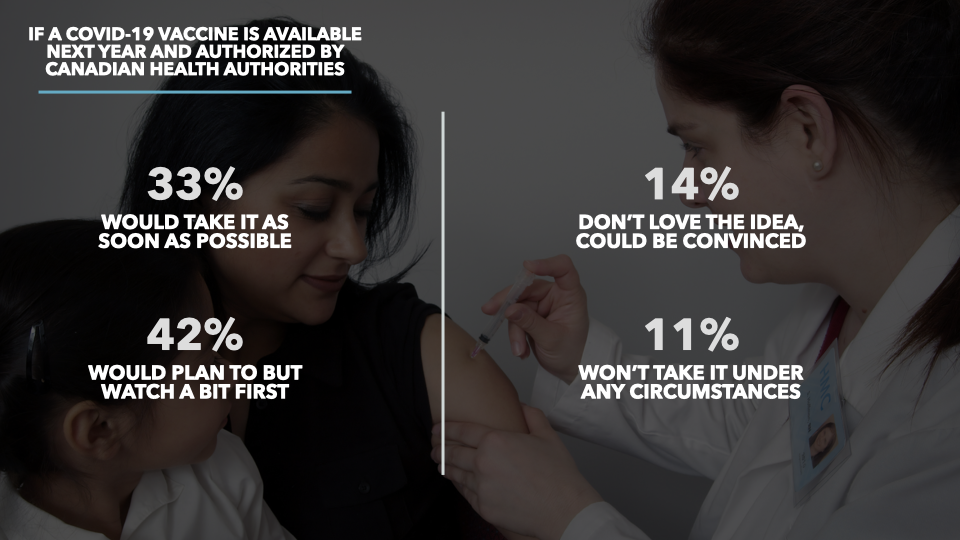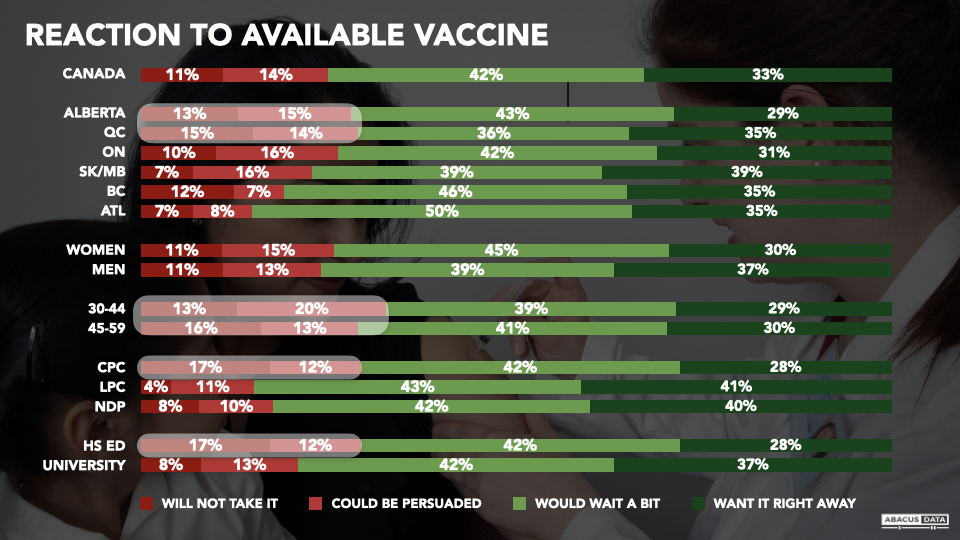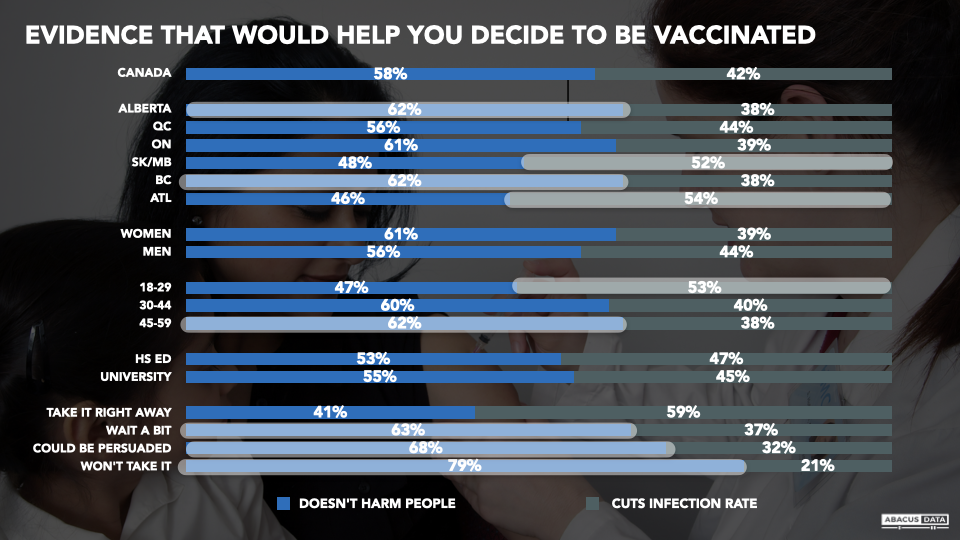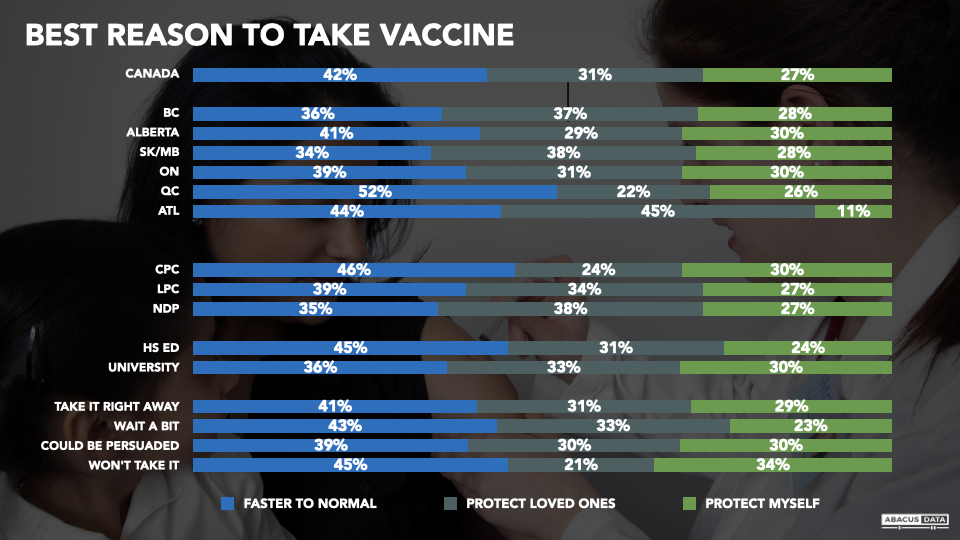1 in 3 Canadians would take a COVID-19 vaccine as soon as its available
November 9, 2020
As Canada grapples with rising infection rates, the news of a potential breakthrough in the race for a vaccine today has undoubtedly stirred hopes of a quicker return to normal than may have seemed possible even a week ago.
If we assume that the results of the trials continue to be positive, and the Pfizer vaccine is approved for use, then the questions that will determine the pace of a return to normal revolve around the availability of the vaccine and take-up rates.
Our latest research shows:
• One in three Canadian adults say they would take an authorized vaccine as soon as it was possible for them to have it.
• Another 42% would plan on taking the vaccine but would prefer to watch the impact of the vaccine on the rest of the population for a bit before doing so.
• 14% say they are not keen on the idea of taking a vaccine but could be persuaded to.
• Finally one in ten says they will not take such a vaccine under any circumstances.

Hesitation rates for taking a vaccine are slightly above average in Alberta, Quebec and below average in BC and Atlantic Canada. Hesitation is highest among those in the 30-44 age group.
The most prominent differences occur around education and partisan orientation: those with a high school education are twice as likely to say they will not consider a vaccine compared to those with university education. Conservative voters are 4 times more likely than Liberal voters to refuse a vaccine under any circumstances.

Our research reveals that hesitation is much more likely to be a function of worries about potential harm than effectiveness at reducing infection rates.

Roughly two-thirds of those who say they will ‘wait a bit’ or ‘dislike the idea but could be persuaded’ to take a vaccine say their hesitancy is about possible side effects of the vaccine.
Many may be motivated to take a vaccine for self-protection (27%), the protection of loved ones (31%), but even more people (42%) say the best reason to be vaccinated is to speed a return to normal activities and life.

UPSHOT
“As attention turns to one or more promising vaccines and the potential for distribution of these products in the nearer term the focus for many will be on how quickly normal life, regular business activities and economic health can return. Part of arriving safely at normal is getting a vaccine to people and ensuring enough people take it to produce the widespread benefit it can hold.
Officials in Canada can continue to bank on the trust that most people here have in their determination to be guided by safety and at the same time to be cognizant that the mental health and economic toll have been heavy and a safe path out of the pandemic circumstance is of huge importance, everywhere. Reliable, trustworthy information about effectiveness will help promote take-up, but even more important will be steady evidence of no harmful side effects.”
ABOUT ABACUS DATA
We are the only research and strategy firm that helps organizations respond to the disruptive risks and opportunities in a world where demographics and technology are changing more quickly than ever.
Find out more about what we are doing to help clients respond to the COVID-19 pandemic.
We are an innovative, fast-growing public opinion and marketing research consultancy. We use the latest technology, sound science, and deep experience to generate top-flight research-based advice to our clients. We offer global research capacity with a strong focus on customer service, attention to detail and exceptional value.
We were one of the most accurate pollsters conducting research during the 2019 Canadian Election.

Contact us with any questions.
Find out more about how we can help your organization by downloading our corporate profile and service offering.
METHODOLOGY
The survey was conducted with 1,500 Canadian adults from October 20 to 25, 2020. A random sample of panellists was invited to complete the survey from a set of partner panels based on the Lucid exchange platform. These partners are typically double opt-in survey panels, blended to manage out potential skews in the data from a single source.
The margin of error for a comparable probability-based random sample of the same size is +/- 2.6%, 19 times out of 20.
The data were weighted according to census data to ensure that the sample matched Canada’s population according to age, gender, educational attainment, and region. Totals may not add up to 100 due to rounding.




